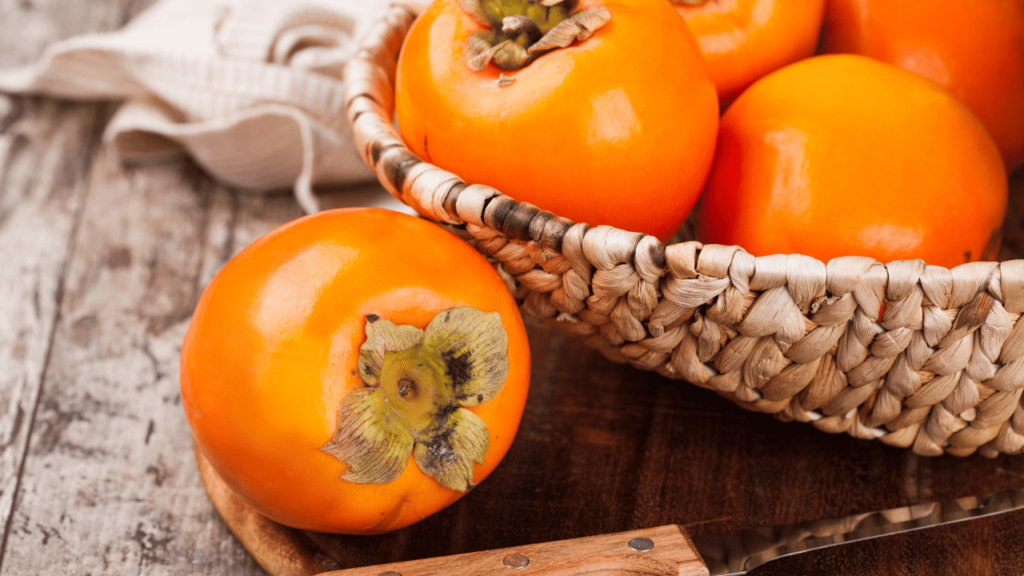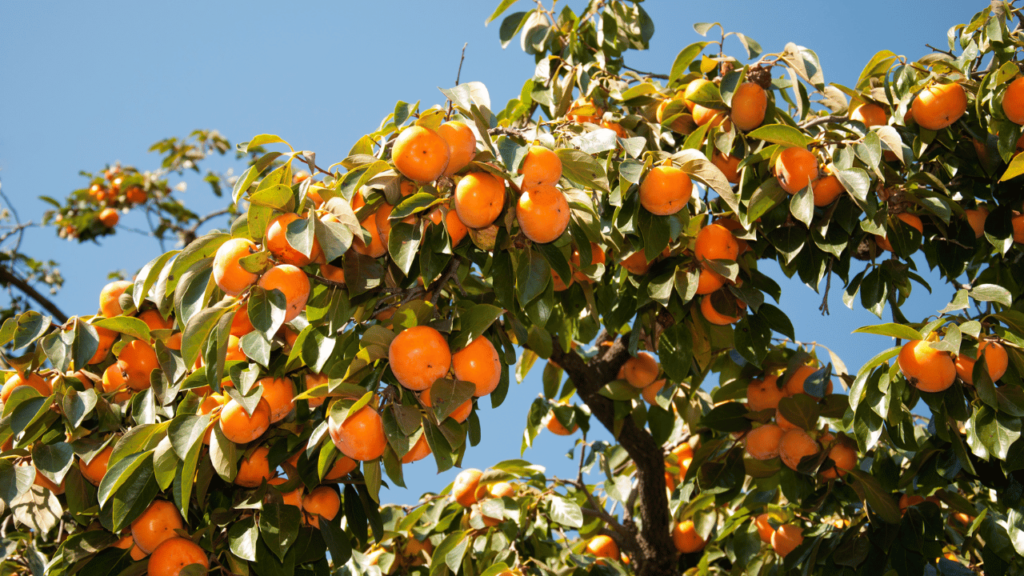Fresh Persimmon
Fresh Persimmon is a tasty fruit that is originally from East Asia but is now grown in many parts of the world. It has a unique flavor, which is sweet and slightly tangy. Persimmon has an oval or round shape and its color is typically from yellow to orange-red because of its variety. The flesh of a ripe persimmon is soft and juicy, with a texture similar to a ripe mango. Some people compare the taste of a persimmon to a mix of apricot and honey. This delightful fruit can be enjoyed on its own or used in various recipes, like salads, desserts, and even jams.

How does Persimmon grow on the Persimmon Tree?
Persimmons grow on trees, They are deciduous trees, which means they shed their leaves in the fall. The Persimmon develop from the small yellow flowers which are produced by trees in spring. It first grows and turns its color off green and when it ripens it changes its color to yellow or orange. The growth pattern of persimmon varies depending upon its variety Some persimmon trees require cross-pollination, while others are self-pollinating. After the fruit is ripe, it can be harvested and enjoyed. Persimmon trees can be a beautiful addition to a garden or orchard, providing both aesthetic appeal and tasty fruit.

Cultivation of Persimmon
Persimmons are found in several countries around the world. They are native to East Asia and are commonly grown in countries like China, Japan, and South Korea. In addition to East Asia, persimmons are also cultivated in countries such as Spain, Brazil, Italy, and the United States. The specific varieties and availability of persimmons may vary depending on the region and climate. It’s always exciting to see how certain fruits are enjoyed in different parts of the world.
Types Of Persimmon
There are several types of persimmons, each with its own unique characteristics. Two common varieties are the Fuyu and the Hachiya persimmons.
Fuyu Persimmons
Fuyu Persimmons are known for their sweet and crisp texture. They are typically round and have a squat shape. Fuyu persimmons can be eaten when they are firm and still slightly crunchy, similar to an apple. Fuyu Persimmon can be consumed fresh or used in salads, desserts, and baked goods.
Hachiya Persimmons
Hachiya persimmons are known for their rich, honey-like sweetness. They have an elongated shape and are usually larger than Fuyu persimmons. Hachiya persimmons must be fully ripe and soft before being eaten. They become very soft and almost jelly-like when ripe. These persimmons are often used in baking, making jams, or enjoyed on their own.
These are just a couple of the many varieties of persimmons out there. Each variety of Persimmon has its own unique flavor and texture. It’s always fun to explore different types of fruits,
Benefits Of Persimmons:
Persimmons have a range of health benefits. They are packed with nutrients and can add to a balanced diet. Here are some benefits of persimmons:
- Nutrient-rich: Persimmons are a good source of vitamins A, C, and E, as well as dietary fiber and minerals like potassium and manganese.
- Antioxidant properties: Persimmons contain antioxidants like beta-carotene and lycopene, which help protect the body against damage from harmful free radicals.
- Heart health: The fiber and potassium in persimmons can support heart health by helping to regulate blood pressure and cholesterol levels.

- Digestive health: The dietary fiber in persimmons can aid digestion and promote healthy bowel movements.
- Eye health: Persimmons are rich in vitamin A, and other beneficial antioxidants for eye health and may help reduce the risk of certain eye conditions.
- Immune support: The Vitamin C content in persimmons can help boost the immune system and support overall health.
Remember, it’s always best to consult with a healthcare professional for personalized advice and enjoy persimmons as part of a balanced diet.
Famous Dishes Of Persimmons
Persimmons can be used in a variety of delicious dishes. Here are a few ideas:
- Fresh Persimmon Salad: Slice ripe persimmons and toss them with mixed greens, goat cheese, walnuts, and a light vinaigrette for a refreshing salad.
- Persimmon Salsa: Dice persimmons with red onion, jalapeño, lime juice, and cilantro for a tangy and sweet salsa. We can use it as a topping for grilled fish or tacos.
- Persimmon Smoothie: Blend ripe persimmons with yogurt, banana, and a splash of orange juice for a creamy and nutritious smoothie.
- Persimmon Bread: Use pureed persimmons in place of bananas in your favorite banana bread recipe for a unique twist. It adds a lovely sweetness and moist texture.
- Persimmon Jam: Cook down ripe persimmons with sugar and a touch of lemon juice to make a delicious homemade jam. It can be enjoyed with toast and can be used for the topping of pancakes or waffles.
These are just a few examples, but there are so many more ways to enjoy persimmons in various dishes. Get creative and have fun experimenting with this tasty fruit.
Side Effects Of Persimmons
While persimmons are generally safe to eat, consuming excessive amounts can sometimes lead to certain side effects. Some are given below:
- Tannins: Persimmons contain tannins, which can cause a dry and puckering sensation in the mouth. This is more common when eating unripe persimmons or consuming large quantities.
- Gastrointestinal Issues: Eating too many persimmons, especially if they are not fully ripe, can potentially cause digestive discomfort such as diarrhea or an upset stomach.
- Allergies: Although rare, some individuals may have an allergic reaction to persimmons. Symptoms can include itching, swelling, or difficulty breathing. If you experience any of these symptoms, seeking medical attention is best.
Remember, these side effects are not very common, and most people can enjoy persimmons without any issues. As with any food, it’s important to listen to your body and consume them in reasonable amounts. Additionally, if you have any specific concerns or medical conditions, it is best to consult with a healthcare professional to ensure it is safe for you to consume persimmons.